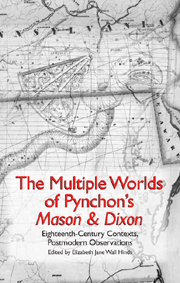 The Multiple Worlds of Pynchon's 'Mason and Dixon'
The Multiple Worlds of Pynchon's 'Mason and Dixon' Book contents
- Frontmatter
- Contents
- Preface
- Note on Quotations from Mason & Dixon
- The Rounds of History
- Consumption Then and Now
- Space and Power
- 4 “America was the only place …”: American Exceptionalism and the Geographic Politics of Pynchon's Mason & Dixon
- 5 Postmodernism at Sea: The Quest for Longitude in Thomas Pynchon's Mason & Dixon and Umberto Eco's The Island of the Day Before
- Enlightenment Microhistories
- Works Cited
- Notes on the Contributors
- Index
5 - Postmodernism at Sea: The Quest for Longitude in Thomas Pynchon's Mason & Dixon and Umberto Eco's The Island of the Day Before
from Space and Power
Published online by Cambridge University Press: 12 September 2012
- Frontmatter
- Contents
- Preface
- Note on Quotations from Mason & Dixon
- The Rounds of History
- Consumption Then and Now
- Space and Power
- 4 “America was the only place …”: American Exceptionalism and the Geographic Politics of Pynchon's Mason & Dixon
- 5 Postmodernism at Sea: The Quest for Longitude in Thomas Pynchon's Mason & Dixon and Umberto Eco's The Island of the Day Before
- Enlightenment Microhistories
- Works Cited
- Notes on the Contributors
- Index
Summary
… all over the World all day long that fifth and sixth of June, in Latin, in Chinese, in Polish, in Silence,— upon Roof-Tops and Mountain Peaks, out of Bed-chamber windows, close together in the naked sunlight whilst the Wife minds the Beats of the Clock,— thro' Gregorians and Newtonians, achromatick and rainbow-smear'd, brand-new Reflectors made for the occasion, and ancient Refractors of preposterous French focal lengths,— Observers lie, they sit, they kneel,— and witness something in the Sky. Among those attending Snouts Earth-wide, the moment of first contact produces a collective brain-pang, as if for something lost and already unclaimable,— after the Years of preparation, the long and at best queasy voyaging, the Station arriv'd at, the Latitude and Longitude well secur'd,— the Week of the Transit,— the Day,— the Hour,— the Minute, — and at last 'tis, “Eh? where am I?”
— Mason & Dixon, 97THUS DOES PYNCHON'S NARRATOR describe the first great moment of the scientific adventures of Charles Mason and Jeremiah Dixon, and the most significant astronomical event of 1761. For the first time in over 120 years, the planet Venus moved across the face of the sun, providing an unprecedented opportunity for measuring the scale of the solar system. The scientific academies were well prepared for this event, and astronomers and their instruments had been dispersed around the world, the better to judge the true magnitude of the Solar Parallax, which would yield an accurate determination of the distance from earth to sun.
- Type
- Chapter
- Information
- The Multiple Worlds of Pynchon's 'Mason and Dixon'Eighteenth-Century Contexts, Postmodern Observations, pp. 125 - 144Publisher: Boydell & BrewerPrint publication year: 2005
